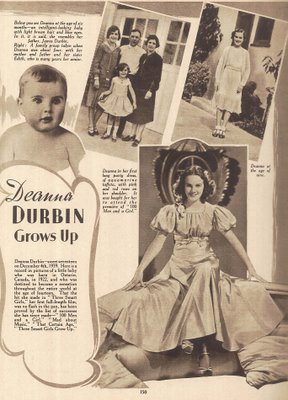
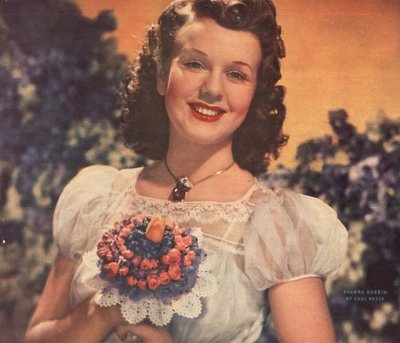
Monday Glamour Starter --- Deanna Durbin --- Part One
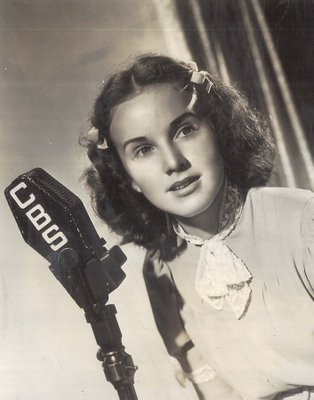
The road has stretched a long way since Deanna Durbin first came upon the scene, stole our collective hearts, then retreated into a very private life. She’s 84 now, so how old does that make her fans? As to more of them generated since her retirement in the late forties, I say, show me. It’d be great to report an upsurge of interest in Deanna, and I say that as an admirer of long standing, but what chance has the woman got when no one’s showing her all but one black-and-white features? The tiny niche of Durbin-philes grieve more over this than the lady herself, who’s worried not the least about preserving the legacy of a screen character she neither understood nor identified with. Durbin just walked away from it all and never came back. Others did too, but only after careers had washed out with tides. Durbin could have stayed in and triumphed another twenty or thirty years. I’ll bet there wasn’t a colleague of hers in show business that didn’t look on admiringly and say smart move, as she packed off to France and blessed anonymity.
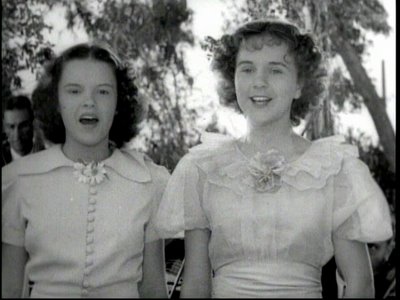
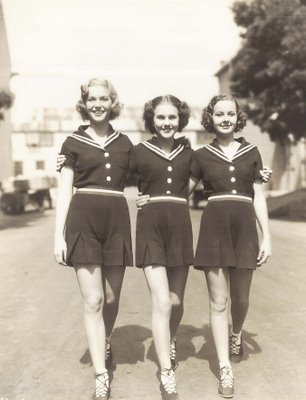
I have this image of Deanna walking briskly down cobblestone streets of her little French village carrying one of those yard-long loaves of bread, possibly singing I Love To Whistle, as she makes her way back to a heavily fortified chateau guarded by dogs named Bruno and Gaston. Journalists have sought her from time to time, but the simple folk in their pastry shops and laundries would feign ignorance in deference to their celebrated neighbor. So what made this highest paid actress in motion pictures high tail it out of the US? Deanna explained in the one interview she’s done in 56 years (with British historian David Shipman in 1983). I consider my salary as damages for having to cope with such complete lack of quality, she said, describing her last four Universal pictures as mediocre … near impossible. There had been twenty-one features and one short (plus a handful of Red Cross and war relief spots). She might have said there was one feature done twenty-one times. Being locked into a formula as unyielding as hers would have jangled anyone’s nerves. Worst of all was fact that Durbin’s screen image was at total variance with everything she was offscreen, and efforts on her part to vary the menu were met with determined resistance, more from her fans than Universal, in fact. What few tentative steps the studio took in that direction (Christmas Holiday, Lady On A Train) saw ferocious objection from the not-so silent army of Deanna devotees. In the end, there was nothing left to do but quit.
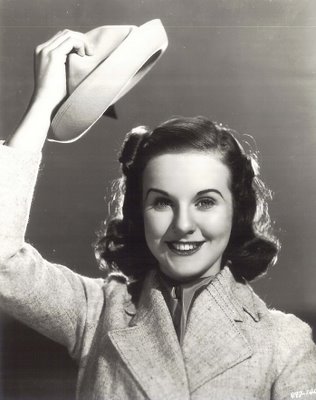
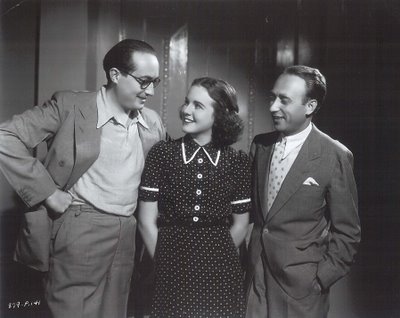
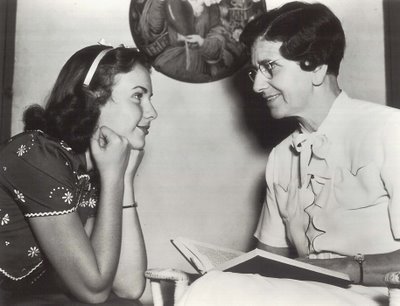
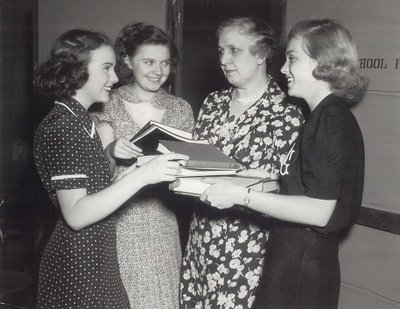 Beginning of it all was 1936. That’s when she joined Eddie Cantor on his CBS radio series and became an airwaves sensation. Child stars being the current rave, there was no question she’d be approached by the film companies, and as things turned out, the one that needed Durbin most desperately was the one that got her. Universal was a minor major, among a "little three" out of the big eight studios. They had production and distribution, but not exhibition. First-run Universal pictures had to get their bookings on merit. Mostly, they serviced rural houses with westerns and serials. Big shows were bigger gambles for them. Metro and Paramount controlled enough venues to guarantee a return on their product. So did Warners, RKO, and Fox. Hard-up Universal was already in receivership when they hired Deanna Durbin. They started slow with $300,000 on a musical comedy, Three Smart Girls, in which Deanna was accorded special-billing. Her overnight stardom was something they all anticipated, for this kind of talent was all but a sure thing. The negative cost of the next one, One Hundred Men and a Girl was goosed to $700,000, and the spiral spun to $850,000 for a third, Mad About Music. This wouldn’t abide, of course, even if Durbin was by now responsible for seventeen-percent of Universal’s overall revenue by the late thirties. Unaccustomed to class pictures, the company had a hard time managing its costs. Deanna’s producer-director team was Joe Pasternak and Henry Koster. They understood the Durbin package and how to make it pay. With these two on board, quality was assured. It was a rigid formula, but an irresistible one. Would the on-screen Deanna work today? She’s pushy, argumentative, manipulative, and not above lying to achieve her ends. That such a character was such an immediate and lasting favorite says a lot about her audience as well. We needed a go-getter to bring us out of the Depression, and this girl was nothing if not that.
Beginning of it all was 1936. That’s when she joined Eddie Cantor on his CBS radio series and became an airwaves sensation. Child stars being the current rave, there was no question she’d be approached by the film companies, and as things turned out, the one that needed Durbin most desperately was the one that got her. Universal was a minor major, among a "little three" out of the big eight studios. They had production and distribution, but not exhibition. First-run Universal pictures had to get their bookings on merit. Mostly, they serviced rural houses with westerns and serials. Big shows were bigger gambles for them. Metro and Paramount controlled enough venues to guarantee a return on their product. So did Warners, RKO, and Fox. Hard-up Universal was already in receivership when they hired Deanna Durbin. They started slow with $300,000 on a musical comedy, Three Smart Girls, in which Deanna was accorded special-billing. Her overnight stardom was something they all anticipated, for this kind of talent was all but a sure thing. The negative cost of the next one, One Hundred Men and a Girl was goosed to $700,000, and the spiral spun to $850,000 for a third, Mad About Music. This wouldn’t abide, of course, even if Durbin was by now responsible for seventeen-percent of Universal’s overall revenue by the late thirties. Unaccustomed to class pictures, the company had a hard time managing its costs. Deanna’s producer-director team was Joe Pasternak and Henry Koster. They understood the Durbin package and how to make it pay. With these two on board, quality was assured. It was a rigid formula, but an irresistible one. Would the on-screen Deanna work today? She’s pushy, argumentative, manipulative, and not above lying to achieve her ends. That such a character was such an immediate and lasting favorite says a lot about her audience as well. We needed a go-getter to bring us out of the Depression, and this girl was nothing if not that.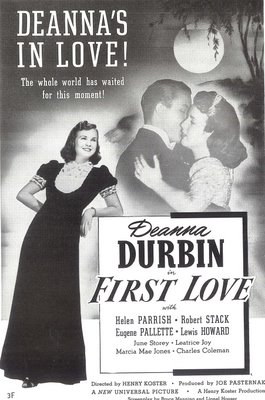
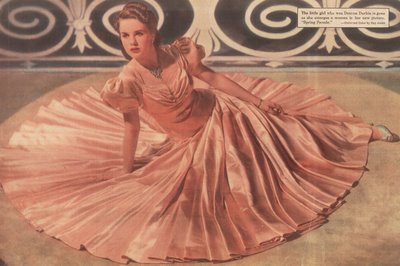
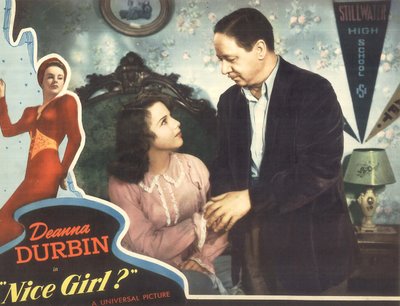
Imitators were inevitable, but who’d have thought Universal would nurture so many of them? The need for a younger substitute to take over child soprano duties for an aging (and increasingly demanding) Deanna resulted in Gloria Jean, but she only emphasized the unique and inimitable ability that was Durbin’s. There was also Susanna Foster, operatic to the point of shattering glassware, but like Gloria, subject to the vagaries of "B" merchandising so typical of the Universal assembly line at that time. I’ve never understood why Foster did Phantom Of The Opera instead of Deanna. Was the idea of a horror film such anathema to the Durbinites? She’d have surely been great in it, and if nothing else would have come away from the career with one movie they’d always remember. All of which brings us to the Judy Garland debate. She ran second to Deanna then, but not now. The Wizard Of Oz took care of that. If we removed Oz from the equation, I wonder how they’d compare. As it is, Judy has survived in the public’s imagination and Durbin has not, yet Garland died 37 years ago and Deanna remains with us. Judy also worked to the very end and left still-popular concert albums. Deanna hasn’t struck a note since the forties. Nevertheless, if I had to pick a winner, I’d have to go with Deanna, because, well, she is still here, after all. Before and after Durbin stepped down, there were ongoing efforts to find her successor. Most of them winnowed on the vine or opted for straight parts. Kathryn Grayson was Pasternak’s first attempt to recreate Durbin after he’d decamped to MGM. Seven Sweethearts was merely the Universal formula transplanted to Culver City. Grayson might have echoed Durbin’s very words when she said her own Metro pictures all seemed alike and took forever to make. Jane Powell was that company's post-war swing at a Durbinesque home run, but Three Daring Daughters, Nancy Goes To Rio (a remake of Deanna’s It’s A Date), and Small Town Girl each lost money. Pasternak desperately wanted Durbin to join him at MGM, though I suspect with his second-tier unit, she’d have faced the same boxoffice uncertainties as Jane Powell. Had she been redirected into Arthur Freed’s group, there’s no doubt we’d have had Deanna singing opposite Gene Kelly and Fred Astaire, which might have been a very rewarding thing.
Photo Captions (Top To Bottom)
Deanna profile from a British fan monthly
Color portrait from an American fan monthly
Doing the Eddie Cantor radio show
Judy Garland and Deanna in Every Sunday (1936)
With Barbara Read and Nan Grey in Three Smart GirlsDeanna in Mad About Music
With Henry Koster and Joe Pasternak
Deanna with her mother
Deanna and fellow students with Universal schoolmarm
Ad art from First LoveFan magazine color portrait
With Robert Benchley in Nice Girl?
4 Comments:
In that picture of Judy and Deanna, isn't Deanna a dead ringer for Billy Boyd as Pippin?
I had always been a fan of Deanna in her Three Smart Girls/100 Men and a Girl phase, but until I bought the "Deanna Durbin Sweetheart Pack" DVD collection I never realized how gracefully she grew into young womanhood. She had this amazing ability to be coquettish and discreetly erotic at the same time -- look at her casually kicking off her shoes as she sings "The Turntable Song" in Something in the Wind; her teasing rendition of "Gimme a Little Kiss" in Lady on a Train; or her open-air bubble bath in Can't Help Singing.
Evidently, none of these or any of her other grown-up pictures did very well at the box office (am I wrong there, John?), but to my eyes and ears at least, they hold up quite well today. I think maybe the audience that so eagerly embraced Little Miss Fix-It With a Song became a bit unsettled when she grew curves and started showing that she knew the difference between boys and girls. It wasn't the Deanna they were comfortable with; who was this outlandish little flirt, anyway?
Enjoyed your write-up on Deanna and her career very much, but just wanted to add a few of my own:
Deanna was signed by Universal in June 1936, approximately two months prior to her debut on Eddie Cantor's TEXACO TOWN radio program on September 20, 1936. A July 1, 1936 blurb in the HOLLYWOOD REPORTER noted that Universal had changed "Edna Mae Durbin's" first name to "Diana."
This appears to have been largely at the instigation of Universal's new casting director, Rufus LeMaire, newly arrived from MGM, who brought both Deanna and Judy Garland to the attention of producer Joe Pasternak and Henry Koster. Some sources indicate that LeMaire, prior to negotiating a contract with Universal, was so impressed with Deanna that he placed her under personal contract at $300 a week. He referred to her as "the blue-eyed youngster with the golden voice."
EVERY SUNDAY, often referred to as a sort of public "screen test" to enable MGM to test the screen appeal of Deanna and Judy Garland, appears to have actually been produced by the studio after Deanna had been released by MGM and signed by Universal.
The reason for this is that there was a clause in Deanna's MGM contract which allowed the studio to call upon her services for up to 60 days following her release, providing she was not working on another film for another studio at the time. As production on THREE SMART GIRLS wasn't scheduled to begin until September 1936, Deanna found herself back on the Metro lot making this short with Judy.
This may well explain why EVERY SUNDAY often seems to be slanted to favor Garland over Durbin. However, when the short was released to theaters in the autumn of 1936, Deanna often received top billing over Judy in newspaper advertisements as "Radio's New Singing Sensation."
It is not true that Deanna's adult vehicles were unsuccessful. While most accounts indicate that her last four films for Universal-International were "disappointing" and Deanna herself recalled them as "a series of failures based on variations of the theme of the concocted Durbin personality," her films up until that time were, according to most accounts, enormous earners for the studio. Indeed, CHRISTMS HOLIDAY was reportedly Universal's biggest moneymaking film up until that time.
Such success undoubtedly would help to explain the enormous salary Universal was paying Deanna. As late as 1947/48, commentary on Deanna's career (in which there was speculation that she might leaveUniversal for another studio), included statements from Unviersal-International that it had "no intention of releasing her."
While Deanna's films have been largely unavailable for public broadcast over the past four decades or so, there are several indicia of enduring interest in her work, including the following:
*When they were released on VHS in the mid-1990s, the DEANNA DURBIN COLLECTION became the best-selling set of classic films in the history of MCA/UNVIERSAL home video, outselling sets devoted to other more visible contemporaries, including Abbott & Costello, Bing Crosby, Bob Hope, Claudette Colbert and Marlene Dietrich. In the opening comments to the films comprising Volume 2 of the Collection, MCA/UNVIERSAL itself refers to the "unprecedented sucess" of her films on home video;
*According to Richard Lamparski, author/editor of the WHATEVER BECAME OF? series of books which, for 25 years updated readers on the lives of celebrities who had dropped out of the public eye, Deanna Durbin was always, from the series inception in the mid-1960s through its' last volume in the late 1980s (16 editions in all, as I recall), "the most consistently asked about star of the past.";
*Over the past several decades, the BBC has reported that it receives overwhelmingly more requests fromt the public for Deanna's films and recordings than for those of any other star of Hollywood's Golden Age.
There have also been over 20 compilations released to date of Deanna's soundtrack and DECCA recordings on compact disc. In a 2000(?) BBC/WALES radio poll asking listeners to name the "Greatest Performers of the 20th Century," Deanna Durbin, at Number 3, was the top female vote getter on the list;
Deanna has enjoyed an iconic status in Russia since her films were first released there in the late 1930s/early 1940s. According to one report, she was cited by the KGB in the 1960s as the "vocal ideal" for young women wishing to study music, and, as recently as the mid-1990s, the Moscow Film Institute has scheduled yearly showings and lectures on her films which have always played to packed houses.
Such enduring interest makes MCA/UNIVERSAL's "uwillingness" to release more of her films on DVD (despite the generally poor job the company has done in promoting/advertising its' "classic film" collections in general), all the more bewildering, but perhaps they will get around to it in time.
Thanks again for the enjoyable write up and elegant presentation.
I "Can't Help Singing" when I read anything on Deanna Durbin! Thank you for the wonderful pictures on your blog. She truly epitomized "the girl next door" for moviegoers.
Post a Comment
<< Home